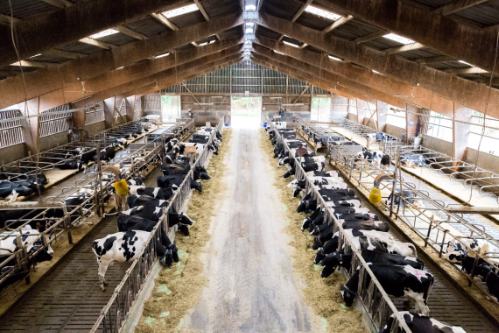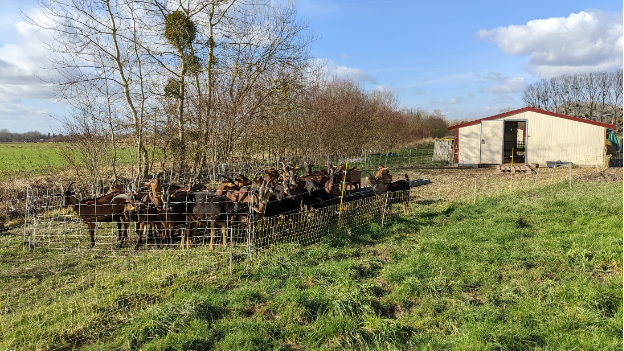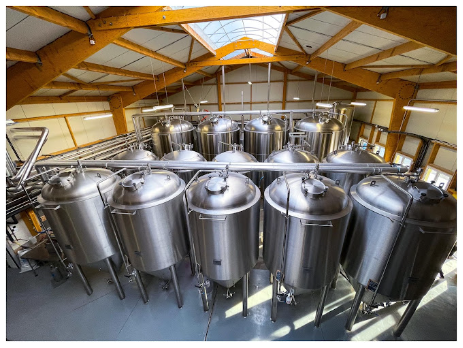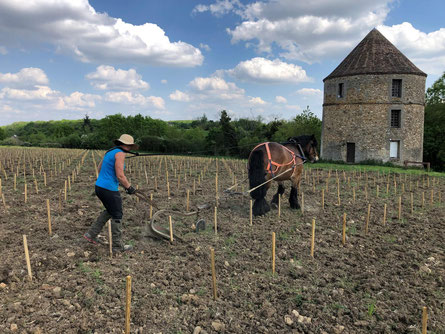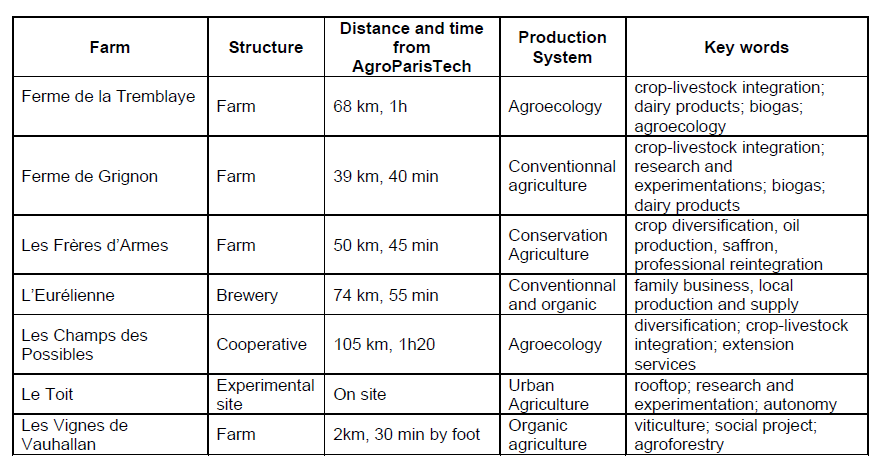We've organised this field trip with a number of objectives in mind: to visit local farms, to see a variety of production systems and activities, to look at technical aspects, but also to discuss the link between production and transformation and their integration into the local territory. But the main aim is to share knowledge, to test, to smell and to taste! The programme therefore includes vineyards, saffron, goats, cows, mills, cheese, yoghurt, biogas, vegetables on a roof... We hope that you will enjoy these visits and that they will give you an insight into the diversity of our region and the projects it hosts!
We invite you to read the description of these visits and, when filling in the registration form, to indicate 3 choices in order of preference. We will do our best to satisfy your first choice.
1 - La Ferme de la Tremblaye
Source : https://parifermier.com/producteurs/ferme-de-la-tremblaye/
The Ferme de la Tremblaye has a long history dating back to the Middle Ages. Initially a cereal producer until 1967, the farm introduced cows to regenerate the soil and later set up a cheese dairy. Goats were added in 2000 to diversify. A wood-fired boiler was installed in 2006, using sustainably sourced trees, and in 2012 an agricultural methaniser was built to convert waste into electricity and natural fertiliser. The farm is now energy self-sufficient, the first positive energy farm, and focuses on agro-ecology and sustainable practices, offering a range of high quality products. The cheese factory combines modern techniques with traditional methods, with manual processes by skilled cheese-makers ensuring the proper maturation of high-quality farmhouse cheeses. The Ferme de la Tremblaye now has 240 hectares of arable land and 266 hectares of woodland. It also has 220 cows and 550 goats.
Website : https://www.fermedelatremblaye.com/en
Key words : crop-livestock integration, dairy products, biogas production, agroecology
2- La Ferme de Grignon
Source : https://magazine.laruchequiditoui.fr/grignon-la-ferme-de-la-grande-ecole/
The Grignon farm is an experimental farm for sustainable agriculture affiliated to AgroParisTech. It farms 400 ha and has 180 dairy cows and 650 ewes. It has an on-site processing unit that turns almost half of its milk into yoghurt. The farm has a methanisation unit that produces biogas to supply the neighbouring town. It also has a "kitchen" that automatically prepares part of the ration for the dairy cows. Finally, the farm carries out a number of precision farming experiments with arable crops and the dairy herd. The farm is also used in the AgroParisTech educational programmes. The visit will present these different activities and discuss the links between them.
Websites :
https://www.fermedegrignon.fr/
« Trajectoire » experimental platform : https://plateforme-trajectoire.agroparistech.fr/ (Frrench only)
Key words : crop-livestock integration, research and experimentations, biogas production, dairy products
3 - Les Frères d’Armes
Source : https://www.entrepriseetdecouverte.fr/visite/les-freres-darmes/
Founded in 2016, the two brothers wanted to diversify the family cereal farm. In an area highly specialised in cereals, they have integrated a wide range of crops into their rotation: sorghum, sunflowers, chickpeas, lentils, oats... but also saffron! The farm practices conservation agriculture. The brothers have also invested in a mill which allows them to add value to their production by producing their own flour and offering a range of oils (sunflower and saffron, some of which are organic). The farm is in partnership with the military governor of Paris and aims to integrate soldiers at the end of their careers into the agricultural sector. The visit will enable you to learn about the technical and agronomic aspects of conservation agriculture, as well as the challenges of diversification and processing.
No Website
Key Words : crop diversification, oil production, saffron, professional reintegration
4 - Les Champs des Possibles
Source : Solène Pissonnier, Photo personnelle
Les Champs des Possibles is a cooperative that facilitates the establishment of farmers wishing to develop an agricultural or agri-food business in the Ile-de-France region. They support projects in crop and livestock production and food processing. Les Champs des Possibles offers space, equipment and support to market gardeners, shepherds, bakers, etc. It enables entrepreneurs to test the viability of their project by experimenting in real conditions and also provides accommodation for entrepreneurs who wish to pursue their project on a salaried basis within a cooperative framework. The visit will be an opportunity to learn more about this unique and original cooperative and to talk to various project leaders in plant, animal and food production.
Key words : diversification ; crop-livestock integration ; extension services
Website : https://www.leschampsdespossibles.fr/ (french only)
5 - Brasserie l’Eurélienne
Source : https://leurelienne.fr/brasserie-artisanale/
L'Eurélienne brewery is located in the heart of the Beauce region, an area specialised in crop production. It was created in 2005 on the family farm and today employs a family workforce. L'Eurélienne beers are now an emblematic local product. The brewery produces more than 5,000 hl per year and offers more than twelve types of beer (including organic beers). Most of the barley comes from the family's own fields, located within a 10 km radius of the brewery. The brewery has diversified its production to include soft drinks. The visit allows you to discover the production process and to talk to the managers about sourcing strategies and barley production.
Website : https://leurelienne.fr/ (french only)
Key words : brewery, family business, local production and supply
The two following sites will be visited together during one afternoon : "Les Vignes de Vauhallan" and "Le Toit AgroParisTech" :
6 - Les Vignes de Vauhallan
Source : https://www.gifaucoeur.com/terres-pr%C3%A9cieuses-1-2/tome-2-extraits/les-racines-du-temples/
Planted in the spring of 2022 on 1.2 hectares near a small abbey, the vineyard is managed by two partners, both of whom have two jobs. Two varieties are currently grown organically: Pinot Noir and Gamay. The site is also developing agroforestry to improve ecosystem services. The viticulture project also aims to create a social fabric around the vineyard and with the local territory, to which the vines bring a new dimension. The visit will enable you to understand how this project came about in an area where vines had disappeared, to learn about the technical aspects of viticulture and to discuss the importance of developing a social network around this project.
No website
Key words : viticulture, organic agriculture, social project, agroforestry
6 - Le Toit AgroParisTech
Source : Eva Goyat, sur les essais 2023
In 2012, AgroParisTech developed an experimental rooftop on its former site in the 5th arrondissement of Paris. This initiative was born out of the growing interest in rooftop production, particularly in dense urban areas, and the lack of concrete data on the subject. This led to the work of Baptiste Grard on Technosols (PhD B. Grard, 2017) with Christine Aubry, as well as numerous internships and projects bringing together different research units (ECOSYS, SADAPT, GENIAL, ESE). This work was led in particular by Sophie Joimel, a researcher and lecturer in soil ecology at AgroParisTech, who studies soil biodiversity in urban and agricultural environments.
When AgroParisTech moved to its new campus, some of the experimental equipment was moved to the new roof. Today, the research activities on the roof are dedicated to different projects. To date, three systems of wooden containers have been installed or are under construction: - Two systems of about 40 wooden containers each, on soil fertility.
- A system of 20 wooden containers dedicated to a research project on the water autonomy of productive planters (market gardening).
These rooftop systems will enable a wide range of factorial and systemic research to be carried out on technosols, soil biodiversity and fertility, as well as the analysis of technical production systems in constrained environments.
Key words : urban agriculture ; rooftop ; research and experimentation ; autonomy
Summary table :







